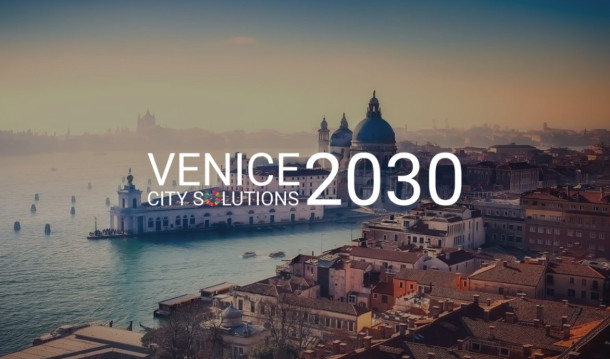
Venice City Solutions 2030
Now in its third edition, Venice City Solutions 2030 was held this year on 26-27 November. The event, co-organised by United Cities and Local Governments (UCLG) and its Italian section AICCRE, the UNDP, UN-Habitat and the UN SDG Action Campaign, aimed to make advances towards the local implementation of the SDGs. Insights from metropolises around the world were shared during the two-day meeting. This 2020, the event shed light on how the 2030 Agenda can be a long-term planning instrument for cities and how the SDGs play a key role in assessing, analysing and creating a future vision for territories.
The first day of the session served as an introduction to the topic, taking a look at the role of a sustainable transition in the future of urban spaces. In particular, the speakers reflected on coordination between different stakeholders to reach the UN goals.
“We want you to visualise the SDGs in cities. The only way the SDGs will be achieved and the 2030 Agenda can succeed is if they are owned by cities.” Emilia Saiz, UCLG Secretary General, clearly highlighted the importance of local governance in implementing sustainable development strategies. She talked about the need for a new approach to policy on urban issues and stated: “Transformation has to be local or it will simply not happen.”
This emergency period is seen by many people as an opportunity to make that transformation possible. Marina Ponti, UN SDG Action Campaign Director, reflected further on this point: “Political leaders around the world are discussing how to rethink the system. [...] We have reached a turning point: there must be a dialogue between all levels of government so that everyone has the same opportunities.” Only through dialogue and collaboration can local and regional governments learn by doing and fight for a more sustainable future. This was a common point made by many of the speakers. Among them, Rafael Tuts, coordinator of the Urban Planning and Design Branch of UN-Habitat, insisted: “No city can reach the SDGs and survive on its own. We need innovation and mutual learning and cities need to be at the heart of development, with special attention given to the most vulnerable groups and minorities.”
Some additional considerations came from Haoliang Xu, UN Assistant Secretary-General and UNDP Director for Policy and Programme Support, who called for a “more resilient, egalitarian and inclusive governance model”, adding that “we need to take the necessary action to implement the 2030 Agenda.”
The second day of the event focused on some practical examples of SDGs being implemented on a local scale, and 5 members of Metropolis intervened to present their experiences: Buenos Aires, the Greater Amman Municipality, La Paz, Madrid and Xi’An.
Nuha Qtaish, Strategic Planning Executive Director for the Greater Amman Municipality, insisted on the importance of data for sustainable urban development: “Using digital tools will be very helpful to understand how to achieve the SDGs; achieving these goals is no longer optional.”
Following the same discourse, Álvaro Blondel, Executive Secretary for La Paz Municipality, presented the ‘Plan La Paz 2040’, which included general considerations on how to manage the crisis on a local level, while reporting interesting data on the localisation of the SDGs: “Covid-19 has come to stay. We have to modify the way we plan our cities in order to respond to this change in dynamics.” Blondel went on to add that “La Paz has responded to 82% of the local actions requested by the SDGs.”
A different perspective was given by Qiang Sheng, Director of Xi’an Foreign Affairs Office, who based his talk on the importance of international platforms and new partnerships in addressing local issues and achieving the SDGs.
Along the same lines, Maricel Lonati, Manager of Institutional Articulation at the General Secretariat and International Relations for the Autonomous City of Buenos Aires, had an interesting point to add: “We co-created a platform for citizen participation and action. From there you can monitor what the government is doing and find out what each citizen can do.”
Lastly, an important reflection on the metropolitan level of local action was presented by Javier Castaño, Senior Adviser at the International Affairs and Cooperation Department of the Madrid Municipality: “The Madrid forest project is of great value on a metropolitan scale: it is about connecting different places in the extensive area surrounding the city. At the same time, the project has generated space for dialogue and participation.”
Developed under the framework of the ‘Cities Are Listening’ initiative, the Venice City Solutions 2030 event provided the opportunity to present UCLG’s Local4Action HUBs, which aim to understand the global impact of local actions for sustainable urban development.

